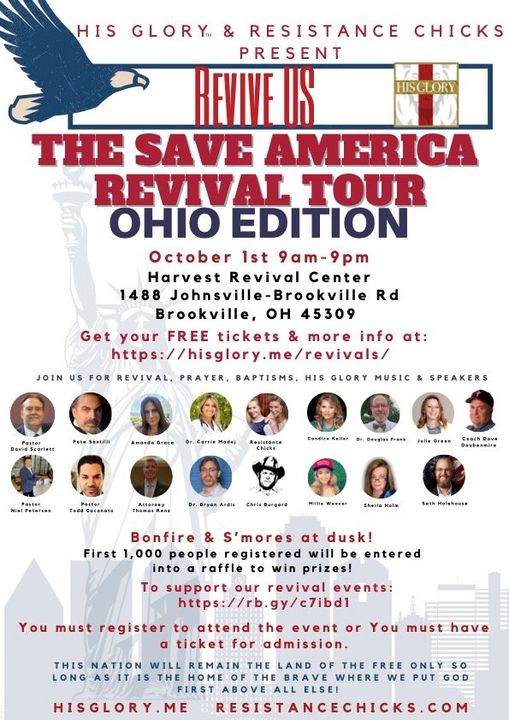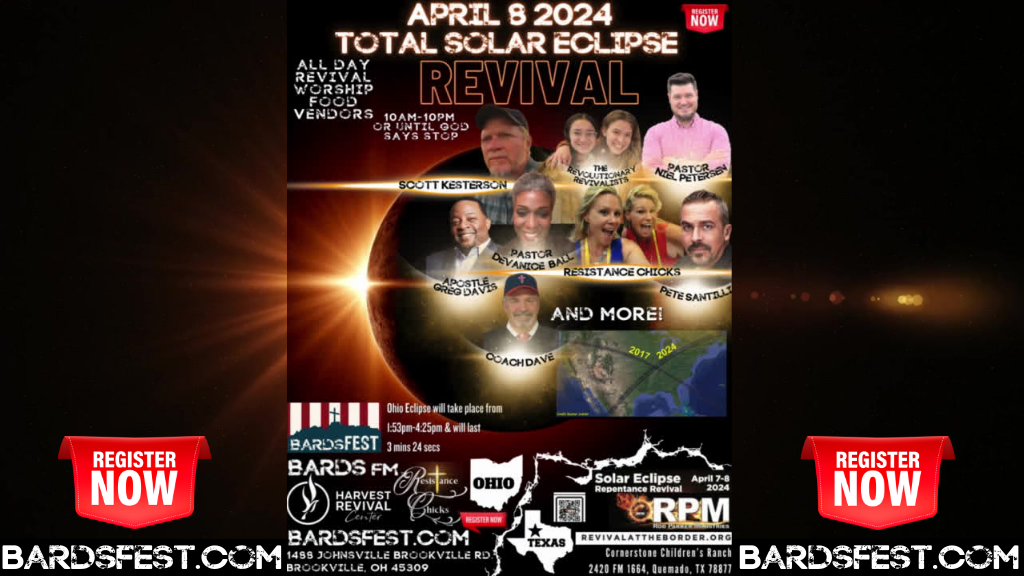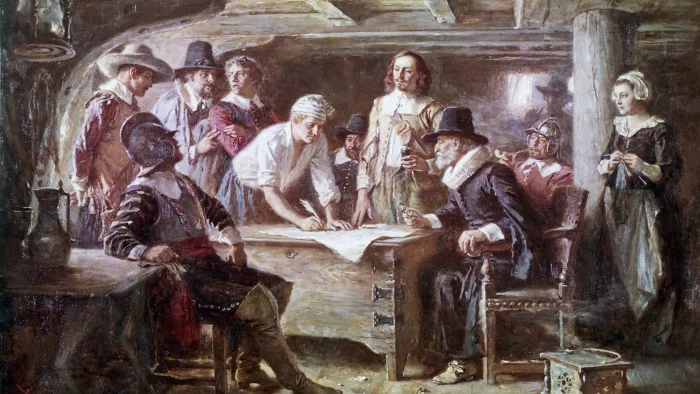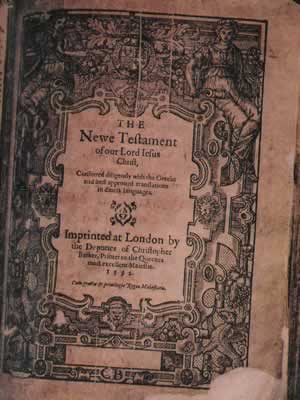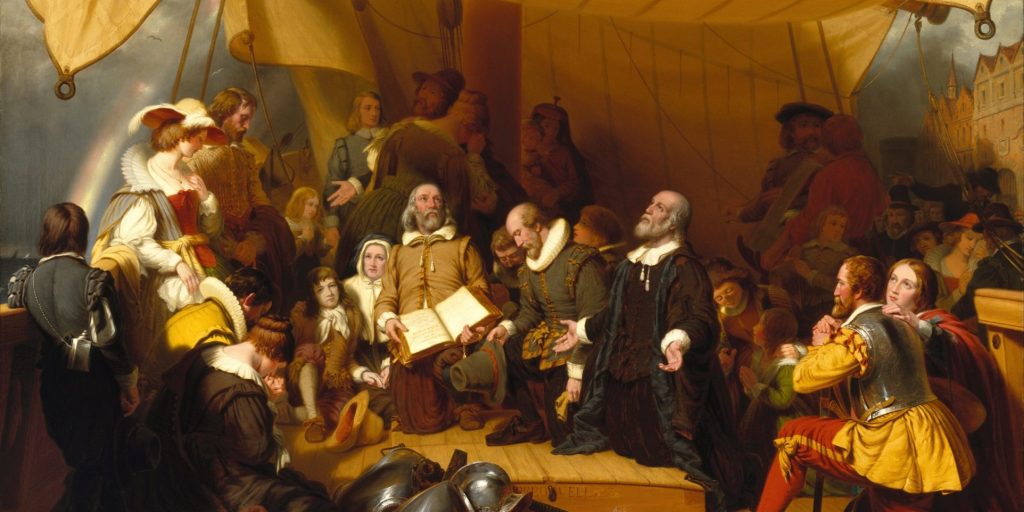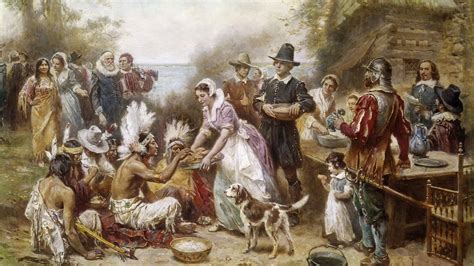How a Small Home Church Changed the World
The year was 1543, King James the VIII declared himself the new protestant king of England and head of the Church of England, overturning the control of the Roman Catholic Church. While This brought about great change, some felt that the state had too much control over the church and retained too much religious ritual. Indeed, you could be harassed, fined, or put in jail for refusing to attend. There were those who felt they could purify the church from within, they were called the Puritans. Then there were those who wanted to split completely from the Church of England or the Catholic Church, almost unheard of in those days. They were known as the Separatists.
We have come to know most famous Separatists as the Pilgrims. But how did a small band of rebels who loved Jesus and wanted to follow his teachings like the early Christian church, end up changing the world? Well, they held their services in secret in the town of Scrooby in Nottinghamshire, England…in a home church.
“In a quiet English village named Scrooby, a group of believers met to observe the Lord’s Day. There were no choirs, no bells, no incense, and none of the ordinary trappings of ceremonial worship. Few would have guessed that this small group of believers in an obscure English village would become the Pilgrim fathers, and that the candle that burned here in this manor home would one day “light a thousand.”
The owner of the home in which the believers of Scrooby met was a gentleman named William Brewster. Unlike many of his fellow Separatists, Brewster had been born into the landed gentry. He had studied at Cambridge as a youth, and had been in the service of the English ambassador to the Netherlands, where he was exposed to the Reformed Faith.
When Brewster returned to England after his time in the Netherlands, he began to take an active role in the leadership of the Separatist church. William and his wife, Mary, desired to worship the Lord in a simple way without the man-made trappings of ceremonial formalism. When Archbishop Bancroft sought to force Puritan ministers out of the church, the Brewsters invited John Robinson and Richard Clifton to meet in their manor house in Scrooby for worship services on the Lord’s Day. This was a courageous step for an English gentleman.
William Brewster held the official position of Postmaster in Scrooby. His large manor house had ample room for the 40 or 50 believers who would assemble there each Lord’s Day. During these days in Scrooby, William and Mary Brewster extended an offer of hospitality to a young orphaned teenager named William Bradford, who often walked to Scrooby and stayed in their manor house on Saturdays so that he could attend the worship services on the Lord’s Day.”http://discerninghistory.com/2021/08/william-brewster-patriarch-of-the-pilgrims/
“So many there… as saw the evil these things… and whose hearts the Lord had touched with heavenly zeal for His truth; they shook off this yoke of antichristian bondage; and as the Lord’s free people; joined themselves (by a covenant of the Lord) into a church estate, in the fellowship of the gospel to walk in all his ways… whatsoever it should cost them.” – Of Plimouth Plantation
This was the same William Bradford who would go on to chronicle the story of this amazing home church congregation, their tragedies and triumphs, in one of the most beautifully preserved historical documents, Of Plimonth Plantation. The beloved Bradford would go on to voted in as governor of the new world colony for 30 yrs.
Bradford told how “they could not long continue in any peaceable condition, but were hunted and persecuted on every side, so as their former afflictions were but as flea-bitings in comparison of those which now came upon them.
“For some were taken and clapped up in prison, others had their houses beset and watched night and day, and hardly escaped their [pursuers’] hands; and the most were fain to flee and leave their houses and habitations, and the means of their livelihood.”
“TO UNDERSTAND THE PILGRIMS’ DEDICATION requires some knowledge of the painful history of how the Bible–printed in their own English tongue–finally became available to them; and of how the Reformation developed in England during the reigns of the Tudor monarchs who immediately preceded James 1.
Not until shortly before the Pilgrims emerged on history’s stage had the Bible been available in any language other than the Latin of the Vulgate, as translated by St. Jerome in the fourth century. The Vulgate powerfully helped to shape civilization for centuries and was the foremost book of the Middle Ages, when Latin was still the tongue of the educated classes.
As soon as the Vulgate was translated into European languages, however, it became accessible to a greater number of people. This was a development that many civil and ecclesiastical authorities–including Henry VIII in his later years–sought to suppress. Thus the lot of the Bible’s translators was a far-from-peaceful one. They faced terrifying punishments: torture, the rack, denunciation as heretics, excommunication, mutilation, and burning at the stake. [The coming of the Bible translations into the local languages of the French people in Europe was a direct result of Peter de Waldo in the 1400’s. This Sabbatarian Christian started the ball rolling, and the Waldensians were hunted down and killed through several Inquisitions by the Pope’s of the time. Estimates of 2 million French believers died in these Inquisitions. I believe one of the pope’s was named Pope Innocent.]
Punishment pursued them even in death. The first complete English translation of the Bible was made in the late fourteenth century by John Wycliffe, Oxford scholar and royal chaplain. After he died, his body was ordered exhumed and burned, with his ashes being cast into the river. And Wycliffe’s translation, completed before the appearance of the printing press, was only in manuscript; as a consequence, except through the preaching of his followers, it reached comparatively few souls.
William Tyndale, who did a translation in the early part of Henry VIII’s reign, had to flee London for the Continent because there was “no place in all England” safe for this Oxford scholar-reformer. He joined Luther in Wittenberg. When he published his English translation of the Bible in 1525 and sent it back to England, many copies (available because printing had arrived by then) were seized and burned. Subsequently, Henry VIII’s agents tracked Tyndale down. He was tried for heresy and sent to jail, where he was strangled. His body was burned.
Thus the Pilgrims, to who the Bible was the very cornerstone of theology, inherited a doleful legacy of civil and ecclesiastical repression”
.https://www.unityinchrist.com/history/saga3.htm
This body of believers grew tired of moving from house to house to escape the watchful eye of the English authorities and while in one of these home church. Sabbath meetings, decided to make the journey to Leyden, Holland where they hoped to practice their faith in freedom. They made a dramatic attempt to emigrate to Holland in 1607 from the nearby town of Boston to escape to the Netherlands, but were betrayed and cast into the prison cells of Boston Guildhall.
The magistrates, said Bradford, treated the Pilgrims “courteously, and showed them what favor they could: but could not deliver (free) them till an order came from the (Privy) Council table” in London; this took some weeks. The order’s moderation when it did arrive implies that the magistrates may have minimized the charges brought against the Pilgrims.
In his summation, Bradford said, “After a month’s imprisonment, the greatest part were dismissed; and sent to places from whence they came: but seven of the principals were still kept in the prison, and bound over to the assizes (court).”
The second attempt at escape to Leyden proved to be even more precarious and hired a Dutch shipmaster to carry them…
“The master espied a great company, both horse and foot, with bills (a long-handled weapon with a hooked blade) and guns and other weapons, for the country (local area) was raised against them. The Dutchman, seeing that, swore his country’s oath, ‘Sacrement!’, and having wind fair, weighed his anchor, hoisted sails, and away.” Which was about all he could sensibly do.
Spies, bounty seekers, must have alerted the sheriff, constables and catchpolls.
The men most sought by the authorities–including Brewster and the Pilgrims’ two Separatist clergymen–fled into the countryside. Bradford said that the Pilgrim men “made shift to escape before the troops could surprise them, those only staying that best might be assistant unto the women.
“Pitiful it was to see the heavy case of these poor women in this distress; what weeping and crying on every side, some for their husbands that were carried away in the ship…others not knowing what should become of them and their little ones; others again melted in tears, seeing their poor little ones hanging about them, crying for fear and quaking with cold.”
On the ship, said Bradford, “the poor men were in great distress for their wives and children which they saw thus to be taken, and were left destitute of their helps; and themselves also, not having a cloth to shift (reclothe) them with, more than they had on their backs, and some scarce a penny about them, all they had being aboard the bark.
“It drew tears from their eyes, and anything they had they would have given to have been ashore again, but all in vain, there was no remedy, they must thus sadly part.”
Normally, it is about 200 miles across the North Sea to the narrow entrance past Texel Island into the Old Zuider Zee (South Sea); and thence some 50 miles south down this great gulf to Amsterdam–which at that time, despite the war with mighty Spain, was the thriving commercial heart of the most advanced and prosperous nation in Europe. But that is not how the trip to Holland went for these profoundly distressed men.
En route, there arose “a fearful storm at sea” and the ship was driven near the coast of Norway 400 miles to the north. The passage consumed two weeks more, and half of that time the Pilgrims “neither saw sun, moon nor stars…the mariners themselves often despairing of life, and once with shrieks and cries gave over all, as if the ship had been foundered in the sea and they sinking without recovery.
“When the water ran into their mouths and ears and the mariners cried out, “We sink, we sink!” they (the Pilgrims) cried, if not with miraculous, yet with great height or degree of divine faith, ‘Yet Lord Thou canst save! Yet Lord Thou canst save!’ with such other expressions as I will forbear.
“upon which the ship did not only recover, but shortly after the violence of the storm began to abate, and the Lord filled their afflicted minds with such comforts as everyone cannot understand, and in the end brought them to their desired haven, where the people came flocking, admiring their deliverance; the storm having been so long and sore, in which much hurt had been done, as the master’s friends related to him in their congradulations.”
MEANTIME, WHAT HAPPENED TO THE WOMEN and children arrested at the creek?
“They were,” said Bradford, “hurried from one place to another and from one justice [of the peace] to another, till in the end they (the authorities) knew not what to do with them; for to imprison so many women and innocent children for no other cause but that they must go with their husbands, seemed to be unreasonable and all would cry out of them.
“And to send them home again was as difficult; for they alleged, as the truth was, they had no homes to go to, for they had either sold or otherwise disposed of their houses and livings.
“After they had been thus turmoiled a good while and conveyed from one constable to another, they (the authorities) were glad to be rid of them in the end upon any terms, for all were wearied and tired with them. Though in the meantime they, poor souls, endured misery enough; and thus in the end necessity forced a way for them…
“And in the end, notwithstanding all these storms of opposition, they all gat at length, some at one time and some at another, and some in one place and some in another, and met together again according to their desires, with no small rejoicing.”
Bradford said there was a special “fruit” from the “troubles which they endured and underwent in these their wanderings and travels both at land and sea.” For in “eminent places”–Boston, Hull, Grimsby–“their cause became famous” because of their “godly carriage and Christian behavior” and they “greatly animated others” to follow their example. There could have been no greater delight to the Pilgrims, with their missionary zeal, than that their example should attract others.[See, persecution spread the Gospel, multiplied their numbers eventually.] https://www.unityinchrist.com/history/saga5.htm
Among the those men to join the Separatists was John Robinson, a man who would lovingly become the shepherd of this small band of believers.
“He was born between March and September of 1575 in the town of Sturton Le Steeple, named for its church spire. He was raised by his parents to love the Geneva Bible, which was small enough to carry, cheap enough to own, and organized enough for personal study. It was truly the “Bible of hearth and home.” Bible reading in the home was the golden thread of the great revival of the Reformation. The family became, as the Puritans called it, “a little church and Commonwealth. Trained in Cambridge University from April 9, 1592 graduating in 1595. It was during this time that he was attracted to the principles of Puritism and its radical (for that time) teachings. “He embraced the rigor of rising at 5 AM, being tutored in Latin, Greek and Hebrew, attending lectures and debates, and learning the art of rhetoric and philosophy. He embraced the fact that theology was the “queen of the sciences,” or the heart of all the other disciplines – like the hub of a wheel. He also learned to appreciate the unique contributions of Peter Ramus (1515-1572), whose logic rested on Scripture in contrast with Aristotle. As a lifetime pursuit, he truly embraced Scrutamini Scripturas (search the Scriptures) in keeping with the focus of the Reformation – Sola Scriptura – the Scripture alone the standard for life and conduct!”
He became a fellow at the University’s Corpus Christi College in 1599 but was not permitted to hold the fellowship if he married. That did not suit him and so he resigned from Cambridge and married to Bridget White, taking the pastorate of St. Andrews, an established Church of England Church under the control of the Bishop.
However he reached the conclusion that he must resign his position as Pastor there. “St. Andrews is not a people separated and sanctified from the world into holy covenant with God… (She) hath not the liberty either to engage any minister… or to remove any… but at the will of the Bishop.” This rejection of top-down, centralized control in the church would be the basis for rejecting the same tyranny in the state. Robinson’s theology was an extension of John Calvin and William Ames. The Pilgrims, through Robinson, became the inseparable link between Calvin’s theology and America’s liberty – all based on the character necessary for maintaining self-government as taught in the Bible.
He then threw in his lot with John Smyth (or Smith) at nearby Gainsborough, William Brewster at Scrooby, William Bradford at Austerfield, Richard Clifton at Babworth and Richard Bernard at Worksop.
“The Scrooby Separatists settled in Dutch city of Leiden in 1609 and Robinson became Pastor to the Church. Under the leadership of Robinson and William Brewster, the congregation grew steadily, and in time the congregation came to number several hundred.
Writing of their time in Leyden, Bradford relates,
“Being thus settled (after many difficulties) they continued many years, in a comfortable situation; enjoying much sweet, and delightful society, and spiritual comfort together in the ways of God; under the able ministry, and prudent government of Mr. John Robinson, and Mr. William Brewster, who was an assistant unto him in the place of an Elder.”
In Leyden most of the Pilgrims got jobs in the cloth industry, the greatest number of weavers in wool, silk, linen, fustian or bombazine (a form of silk with a special weave). Some were wool combers and wool carders. Some made gloves, ribbon and twine. A few were merchants. Some tried several jobs, from baker to printer.
They continued many years in a comfortable condition, enjoying much sweet and delightful society and spiritual comfort together in the ways of God, under the able ministry and prudent government of Mr. John Robinson and Mr. William Brewster who was an assistant unto him in place of an Elder, unto which he was now called and chosen by the church.
“Such was the true piety, the humble zeal and fervent love of this people, whilst they thus lived together, towards God and His ways, and the singleheartedness and sincere affection one towards another, that they came as near the primitive pattern of the first churches as any other church of these later times have done….”
“They fell to such trades and employments as they best could,” said Bradford, “and at length they came to raise competent and comfortable living, but with hard and continual labor.“
The church services of the Separatists were all day affairs, often a 3 hour sermon would be followed by 3 hours of prayer and what they called times of “prophesying,” where the band of believers would join together and ask God to show them how to apply the scriptures to their very lives. It was in one of these moments of praying and prophesying that the call was taken up to go to the New World.
“The journey to America was born out of two fears at the forefront of Robinson’s mind. One, that the group was suffering hardship in a strange land where, to their mind, the children of the group were becoming more Dutch than English. Secondly, a war between Holland and Spain loomed and spelt danger for the freedom they had fled for.”
A small minority of the congregation left on a boat called the Speedwell from Leiden. Robinson gave a solemn service before they left and planned to join them at a later date.
“They know they were Pilgrims,” he said, “and they looked not much back on the pleasant city that had sheltered them, but lift up their eyes to the heavens, their dearest country, and quieted their spirits.” Their final hours with their friends–for most would never again see one another on earth–were poignantly described by Bradford:
He was to have accompanied the second wave of Pilgrims but died in Leiden and a memorial plaque attached to St Pieterkirk Church states that John Robinson was ‘Buried under this House of Worship on March 4, 1625.
The plaque states:
‘His broadly tolerant mind guided and developed the religious life of the Pilgrims of the Mayflower. Of him these walls enshrine all that was mortal. His undying Spirit still dominates the consciences of a mighty nation in the land beyond the seas.’ https://www.mayflower400uk.org/education/who-were-the-pilgrims/2019/june/john-robinson/
John Robinson died in 1625 at only 50 years of age. His wife Bridget died sometime after 1640. Of their eight children, three died in England before turning 50 and four died in Holland. Their fifth child, Isaac, came to America, and we know that he kept the legacy of his father. In Massachusetts, he opposed the mistreatment of Quakers in Falmouth and joined with the revival on Martha’s Vineyard among the Native Americans (where his house still stands.) He died in Barnstable in 1704. Both father and son’s views on family, church and state would become in some measure the foundation of American culture. No wonder Bradford said these words about John Robinson:
“…For besides his singular abilities in divine things (wherein he excelled) he was also very able to give directions in civil affairs, and to foresee dangers, and inconveniences; by which means he was very helpful to their outward estates, and so was every way as a common father unto them… such was the mutual love and reciprocal respect that this worthy man had to his flock, and his flock to him… it was hard to judge whether he delighted more in having such a people, or they in having such a pastor.”
https://plymrock.org/the-legacy-of-pastor-john-robinson/
There is much to be told of that journey to the New World… how the Pilgrims joined forces with a merchant company and New World prospectors.
Rough seas and storms prevented the Mayflower from reaching their initial destination in Virginia, and after a voyage of 65 days the ship reached the shores of Cape Cod, anchoring on the site of Provincetown Harbor in mid-November. Discord ensued before the would-be colonists even left the ship. The passengers who were not separatists–-referred to as “strangers” by their more doctrinaire peers—argued the Virginia Company contract was void since the Mayflower had landed outside of Virginia Company territory. William Bradford later wrote, “several strangers made discontented and mutinous speeches.”
The Pilgrims knew if something wasn’t done quickly it could be every man, woman and family for themselves. While still on board the ship, a group of 41 men signed the so-called Mayflower Compact, in which they agreed to join together in a “civil body politic.” This document would become the foundation of the new colony’s government. Signed on November 11, 1620, the Mayflower Compact was the first document to establish self-government in the New World.https://www.history.com/topics/colonial-america/pilgrims
They landed in the dead of winter. Twenty-three of the Pilgrim mothers died that first winter but most of the children lived as the mothers laid on top of the children to keep them warm. It was known as the starving winter. They were able to make a treaty with the native Wampanog that lasted for 50 yrs. It’s the longest lasting peace treaty in this country. They didn’t just become allies they became friends and the Wampnong actually moved their whole village to live closer to the settlers. They joined together to protect one another from waring tribes. At one point one of their chief lay dying and a couple of the men from the settlement went and nursed him back to health, never leaving his side. The story of the first Thanksgiving is one of the most beautiful real life stories of two cultures coming together. As a side note, according to their charter they didn’t technically have to pay for the land they settled on (which actually was abandoned at the time due to a previous plague wiping out a tribe) but they did. They also found a stash of corn which they did steal in order to plant but vowed to repay it which they did. The Pilgrims were taught how to grow native corn so well that they were able to trade some back to the Native Americans.
“Our harvest being gotten in, our governor sent four men on fowling, that so we might after a special manner rejoice together, after we had gathered the fruits of our labors; they four in one day killed as much fowl, as with a little help beside, served the company almost a week, at which time amongst other recreations, we exercised our arms, many of the Indians coming amongst us, and amongst the rest their greatest king Massasoit, with some ninety men, whom for three days we entertained and feasted, and they went out and killed five deer, which they brought to the plantation and bestowed on our Governor, and upon the Captain and others. And although it be not always so plentiful, as it was at this time with us, yet by the goodness of God, we are so far from want, that we often wish you partakers of our plenty.”
If you ever get an opportunity to make your own Pilgrimage to Plymouth, MA, please visit our friends Leo and Nancy Martin and take one of Leo’s famous tours!!! I guarantee you will learn more then you ever knew and come away feeling a light burning inside of you…
https://thejenney.org/
A fantastic resource of Pilgrim history can be found HERE https://www.unityinchrist.com/history/saga2.htm
Join us LIVE Thursday, November 11th at 8:00 PM ET for an EXCLUSIVE Clouthub Event! Over the next two weeks, leading up to Thanksgiving we plan to host a series of Clouthub meetings focusing on the Christian origins of our nation and how those principles, forged in the fire by the pilgrims and our founding fathers, apply today and how we can walk those out, and expand the Kingdom of God! In a Clouthub “meetings” exclusive, you will be able to “raise your hand” and audibly ask questions of both Resistance Chicks and guests!
Our first meeting will be with Omega Kingdom Ministry who we interviewed at BardsFest this past August. Their goal is in training leaders to lead others in our Christian walk and to equip you in developing Home Congregations (ekklesia/ecclesia) in your community. We will talk about how the very first Thanksgiving was actually birthed out of a home church. Before the pilgrims ever stepped food on this land we call America, they were celebrating Christ in their own ekklesia, home church! You don’t want to miss this incredible series and event!!!
PLUS! Tune in LIVE to be the first to hear about an amazing upcoming event and partnership coming in the spring of 2022 that you DON’T want miss! Read More: Thanksgiving Series: Home Church Addition
Save the date and join us LIVE! ONLY on Clouthub! Click here for link!
Or visit Clouthub.com and go to the “Meetings” tab.
NOTE: You will NEED a Clouthub account to view and join the meeting- so be sure to do that ahead of time!
Clouthub is the NEW, quickly growing, Free-speech platform that everyone is flocking to!



